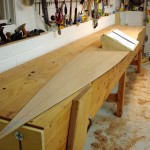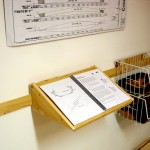The boat’s bottom is 1/4″ plywood. It’s lofted, cut and shaped, an easy bit of work. My turning saw, set up with a fine blade, did the job with ease and left an edge with no tearout or splintering. As always, I’m not confident to cut exactly on the line. I stay a bit proud and then get to the line with a block plane.
is 1/4″ plywood. It’s lofted, cut and shaped, an easy bit of work. My turning saw, set up with a fine blade, did the job with ease and left an edge with no tearout or splintering. As always, I’m not confident to cut exactly on the line. I stay a bit proud and then get to the line with a block plane.
Sitting on the middle of the bottom is a shop desk that I made recently. By design, I have very few horizontal surfaces in the shop and they are either covered with work in progress or too small to use for much more than holding small tools, cans, etc. The instruction booklets, or small paper plans (the big ones are pinned to the wall) have always been at the mercy of temporary space, leaving me to constantly ask myself, “Where’s the book? … Where’s the book?”
 So, I finally did something about it and made a very simple little desk. I used no plans. I just hacked up a bit of old shelf material to make something of suitable size. A few simple dado joints are as fancy as it gets. This isn’t boardroom furniture; I kept it simple and functional. The versatile part of this little desk is the french cleat on the back. I ripped a mating cleat that’s the full width of the shop’s end wall. The desk can now be hung anywhere along that cleat.
So, I finally did something about it and made a very simple little desk. I used no plans. I just hacked up a bit of old shelf material to make something of suitable size. A few simple dado joints are as fancy as it gets. This isn’t boardroom furniture; I kept it simple and functional. The versatile part of this little desk is the french cleat on the back. I ripped a mating cleat that’s the full width of the shop’s end wall. The desk can now be hung anywhere along that cleat.
While at it, I added a cleat to a pair of wire bins. These were good for de-cluttering another part of the shop.
For the sharp-eyed among you, the large sheet of plans hanging above show plank and bottom shapes along with their tables of offsets. … and the stuff on the floor in the corner is the black locust being saved for mallets.
As always, click on any image to see a larger version.
Bob
That is a really cool shop desk and a great use of french cleats. Consider yourself flattered by my forthcoming imitation of the desk and the cleats.
Sincerely
Jeremy
hey bob,
well you’re getting into it now eh? thats a great little shelf – perfect for the workshop. i’ve been enjoying watching the process.
thanks for the great posts.
keep well
tom